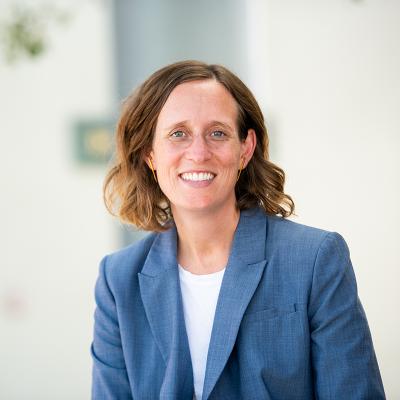New Juvenile Justice Clinic Director Rooted in Social Justice

In some ways, Brooke Harris has been preparing her entire life for her role as the director of the Juvenile Justice Clinic at LMU Loyola Law School.
“I’ve known I wanted to help defend people since before law school,” said Harris, who grew up on the East Coast and moved to Los Angeles after living in the Bay Area for 12 years. “My current role is a dream because it allows me to help underserved clients while also training future attorneys for others. There are a lot of meaningful ways to make an impact.”
In her role as director of the JJC, Harris is charged with providing holistic advocacy for youth clients. This includes defending them in criminal proceedings and providing them with counseling and support via the JJC’s social work staff. She also provides clinical training to upwards of 10-12 students each year. In any given year, that includes up to 10-12 LLS students advocating on behalf of 20-30 juvenile clients with the support of Harris and her team.
Harris joined the JJC as a managing attorney in 2016. She was elevated earlier this month to lead the clinic with the departure of Samantha Buckingham, who is transitioning full-time to teaching.
Under her leadership, the JJC has secured a string of positive outcomes for its clients. Those include securing the release of an incompetent client charged with several serious crimes to a group home, utilizing child welfare laws; having a client charged with transfer to adult court receive a disposition of home on probation and the ability to be reunited with his young son; and securing dismissal of a case after proving that the officers involved lied about a pivotal fact in the case, a lie that was caught on video. JJC attorneys and staff work in tandem with the Youth Justice Education Clinic, which advocates on behalf of clients for the educational services to which they are entitled.
“I love the interdisciplinary nature of our work,” said Harris. “As part of the constellation of clinics that comprise the Center for Juvenile Law & Policy, our work to end the school-to-prison pipeline demands we look at all facets of the juvenile delinquency system.”
Helping pivot the JJC amid the pandemic, Harris helped her students adapt to virtual trial work. She also presented novel legal arguments related to COVID and its unique challenges for her clients. Under her direction, JJC student advocates managed to help clients find freedom with COVID-related arguments.
“This causes incredible distress and further trauma to kids who are already separated from their families,” Harris told the Los Angeles Times about the manner in which pandemic-related isolation was impacting her clients. “Quarantine is becoming routine, and my clients have been in quarantine on multiple occasions in multiple facilities over the recent months.”
In addition to her courtroom success, Harris oversees policy work and has helped create programs designed to influence systemic reform. Most recently, she helped create the Independent Forensic Gang Expert College (IFGEC), which trained former gang members to be expert defense witnesses in cases where gang membership is alleged. The recent class of graduates is now equipped to counter what had traditionally been a one-sided narrative from the prosecution over the defendant’s gang status – a fact that is often inserted into evidence without adjudication.
Harris honed her public-interest legal skills in law school, during which time she served as a law clerk at the Alameda County Public Defender’s Office and a clinical student at the UC Davis Immigration Law and Prison Law Clinics. She also served as an extern to the Hon. Ronald E. Albers and a volunteer coordinator at AIDS Legal Referral Panel. After earning her JD and entering practice, she cut her teeth as a Contra Costa County public defender and later as Juvenile Post-Disposition Reentry Fellow at the National Juvenile Defender Center.
“My time as a public defender taught me to be tenacious, fierce and empathetic. It also further opened my eyes to the expansive racial and economic injustice in our justice systems,” said Harris. “Now that I’m an advocate and teacher, it’s incumbent on me to teach our students to be client-centered, prepared, creative, and passionate.”
The Juvenile Justice Clinic is part of the Center for Juvenile Law & Policy, which also includes the Juvenile Innocence & Fair Sentencing Clinic, Collateral Consequences of Conviction Justice Project, and the Youth Justice Education Clinic. These form the constellation Loyola Social Justice Law Clinic, an umbrella for most of the school’s 20-plus live-client clinics.